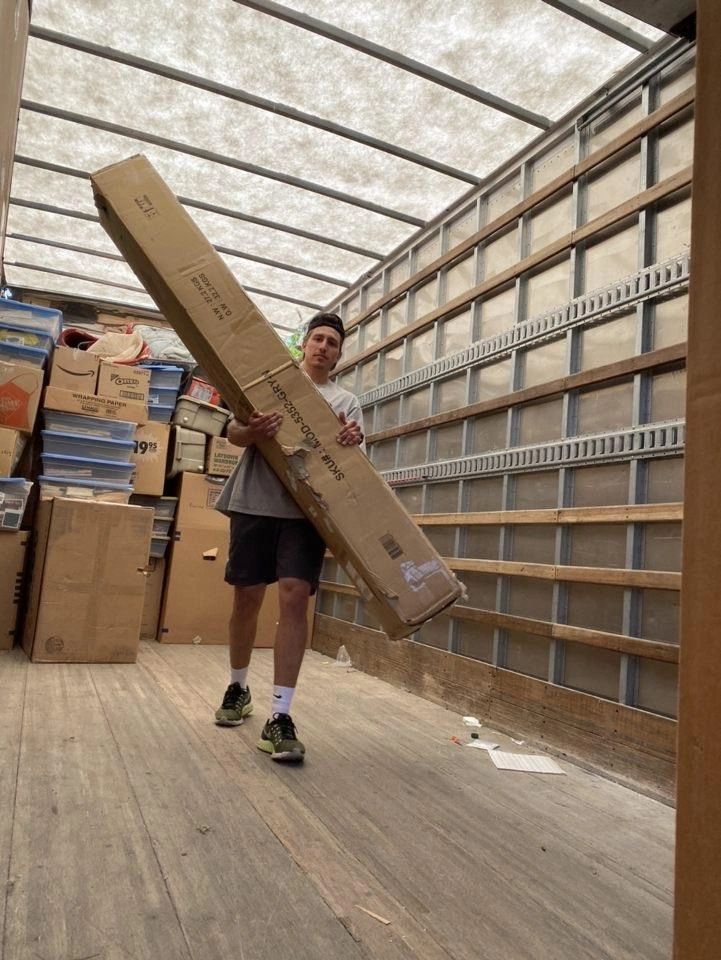Recognizing the Inclusions of moving and Freight Forwarding on the planet of Domestic and International Delivery
Guiding via the intricacies of moving and Freight forwarding can be difficult. Both processes entail distinctive procedures and needs that are crucial for effective transportation. Recognizing the distinctions in logistics, documentation, and threat monitoring is vital for companies and people alike. This understanding can significantly influence the effectiveness and safety of shipments. Numerous are unaware of the certain elements that influence the general experience and outcomes. What factors should one think about to ensure a smooth transition?
The Essentials of moving and Freight Forwarding
moving and Freight forwarding are fundamental parts of the international logistics sector. They help with the transfer of items and personal belongings throughout domestic and worldwide borders. moving mostly involves the relocation of families or individuals, encompassing property and industrial requirements. It typically includes packing, filling, carrying, and unloading products at the destination. On the other hand, Freight forwarding is focused on the delivery of items, commonly wholesale, making use of different transportation settings, such as air, sea, or land.Freight forwarders act as intermediaries, collaborating logistics to guarantee prompt delivery while steering with complicated regulations and custom-mades procedures. Both processes require mindful preparation, company, and communication to ensure efficiency and reduce disruptions. Recognizing these fundamentals is essential for any person entailed in logistics, as they prepared for more advanced aspects of shipping and transport administration.
Trick Parts of Freight Forwarding Services
Freight forwarding solutions include numerous essential elements that assure smooth transport of products. Trick obligations of Freight forwarders consist of handling logistics, collaborating deliveries, and dealing with customizeds clearance. Additionally, understanding important delivery documents is critical for compliance and efficient movement of freight.
Freight Forwarder Responsibilities
A reputable Freight forwarder plays a necessary role in coordinating the transport of items, ensuring that deliveries are taken care of efficiently and in compliance with guidelines. Their obligations include numerous crucial jobs, including picking excellent transport paths, working out Freight rates, and managing logistics. They act as middlemans in between shippers and service providers, guaranteeing that freight is effectively packaged and labeled for risk-free transportation. In addition, Freight forwarders track deliveries, providing updates to clients concerning the standing and anticipated shipment times. They additionally assess and take care of threats connected with transport, suggesting insurance options as needed. By promoting communication and documentation, Freight forwarders enhance the shipping procedure, decreasing prospective hold-ups and improving general supply chain performance.
Shipping Paperwork Fundamentals

Understanding Personalizeds Clearance and Documentation
Exact paperwork is vital in the personalizeds clearance process, as it assures compliance with various guidelines. An overview of customizeds laws highlights the complexities encountered by shippers and Freight forwarders. Usual clearance difficulties can greatly affect delivery timelines and costs, making understanding this aspect crucial for effective logistics.
Relevance of Accurate Documentation
Guiding via the intricacies of international delivery calls for a keen understanding of custom-mades clearance and the critical function of documents. Accurate paperwork is crucial for guaranteeing that deliveries follow regulations and reach their locations without hold-ups. Effectively prepared papers, consisting of bills of lading, business invoices, and packing checklists, facilitate smooth interactions with personalizeds authorities. Inaccuracies can lead to shipment delays, penalties, or also confiscation of products. Extensive paperwork help in monitoring shipments and solving disputes. As a result, services engaged in moving and Freight forwarding need to focus on careful documents practices to navigate the intricate landscape of international shipping properly. This diligence not just improves operations but also boosts client complete satisfaction by making certain prompt distribution.
Custom-mades Rules Review
Guiding customizeds guidelines is an important aspect of international profession that directly influences the success of moving and Freight forwarding procedures. Effective customizeds clearance requires an understanding of numerous policies, consisting of tolls, duties, and import/export constraints. Precise documentation is essential, as it assures compliance with legal requirements and promotes the effective activity of products throughout borders. Secret documents usually include industrial billings, packing lists, and costs of lading, which supply detailed info about the delivery. In addition, customs brokers play a critical function in guiding complex guidelines, acting as middlemans between custom-mades and carriers authorities. By maintaining complete understanding of customs processes, services can greatly minimize hold-ups and decrease expenses connected with international shipping.
Usual Clearance Obstacles
Various difficulties can arise during the custom-mades clearance procedure, often complicating the motion of products throughout boundaries. One substantial issue wants documents, which can bring about fines and hold-ups. Exporters and importers should assure all called for documentation, such as invoices, packing checklists, and certifications of origin, is full and look at these guys accurate. In addition, disparities in appraisal can activate examination from custom-mades authorities, causing added obligations or inspections. Language barriers might additionally present obstacles, as miscommunication can result in misconceptions relating to policies. Additionally, modifications in customizeds policies can produce confusion, necessitating constant alertness by carriers. Eventually, conquering these clearance challenges calls for thorough prep work and a clear understanding of customs requirements to assist in smooth worldwide deals.
Packaging and Labeling Requirements
Although frequently overlooked, product packaging and labeling requirements play an important function in the shipping procedure, guaranteeing that items are secured and easily recognizable throughout their journey. Appropriate product packaging safeguards things from damage throughout transportation, while also facilitating effective handling and storage space. Using proper products, such as bubble wrap, foam, or durable boxes, can stop breakage and loss.Labeling is just as vital. Clear and exact labels convey crucial info, consisting of the location, handling instructions, and contents. Labels have to comply with guidelines details to domestic and worldwide shipping, which may include dangerous products recognition or customs declarations.Moreover, standardized labeling methods simplify the tracking procedure and improve overall logistics efficiency. By sticking to packaging and labeling requirements, services lessen the danger of hold-ups, damages, or misdelivery. Inevitably, these techniques add greatly to the success of moving and Freight forwarding operations, guaranteeing a seamless shipping experience for all celebrations involved
Tracking Shipments: Significance and Methods
Effective product packaging and labeling established the structure for effective shipment administration, but tracking shipments is similarly vital in the shipping process. Shipment monitoring gives real-time exposure, which helps businesses and consumers check the development of their items. This openness enhances client satisfaction, considering that clients can remain informed about shipment timelines and any prospective delays.Several approaches help with efficient monitoring. Barcode scanning is an usual technique, using distinct identifiers to monitor packages throughout their trip. Furthermore, GPS modern technology allows accurate area monitoring, permitting prompt updates and boosted logistics administration. Many shipping firms now supply digital platforms and mobile applications that offer individuals with easy access to tracking information.The importance of delivery tracking can not be overemphasized; it minimizes the danger of lost or harmed products, boosts operational efficiency, and cultivates trust fund between recipients and carriers. As a result, incorporating reliable tracking techniques is crucial for successful residential and global shipping operations.
Insurance coverage Options for Your Item
Protecting insurance coverage for goods en route is an essential consideration for organizations and people alike. Insurance options differ based on the type of shipment, worth of items, and specific risks included. Usual kinds include service provider obligation, which covers loss or damage while en route, and full-value insurance, offering substantial coverage for the overall value of the goods.Shippers may likewise consider aquatic insurance for worldwide shipments, safeguarding against threats connected with sea transportation. It is necessary to analyze the particular demands of the shipment and assess the conditions of any kind of policy.Furthermore, comprehending exclusions and restrictions is crucial to stay clear of potential spaces in insurance coverage. Carriers should engage with insurance coverage experts to discover customized options that fit their distinct situations. Eventually, purchasing the ideal insurance policy can minimize financial threats and provide assurance throughout the delivery procedure.
Choosing the Right moving and Freight Forwarding Solution
When choosing a moving and Freight forwarding solution, it is vital for organizations and people to very carefully examine their particular needs and top priorities. Elements such as the volume of products, destination, and timeline play a significant function in this decision-making process. Looking into different providers is recommended; comparing their solutions, prices, and customer reviews can reveal beneficial insights.Additionally, it is essential to take into consideration the experience and expertise of the service company in handling particular sorts of cargo, specifically for worldwide deliveries that may entail personalizeds clearance. Openness in pricing, consisting of any concealed fees, ought to also be scrutinized.Furthermore, reviewing the level of consumer assistance provided is essential, as timely communication can minimize issues throughout transportation (international cheap long distance movers shipping). Confirming the accessibility of insurance coverage alternatives assures that items are protected throughout the shipping process. By taking these people, actions and companies can make enlightened selections that align with their logistics needs
Often Asked Inquiries
What Sorts Of Item Can Be Shipped Internationally?

Just How Do Shipping Costs Range Different Carriers?
Shipping prices vary greatly in between carriers because of elements such as solution speed, cargo type, range, and added services provided. Each service provider's moving movers prices model reflects these variables, influencing general shipping costs for clients.
Can I Ship Hazardous Products or Perishables?
Delivering harmful products and perishables goes through strict policies. Carriers often require certain packaging, labeling, and paperwork. Carriers must assure conformity with neighborhood and international legislations to prevent fines and assure safe transport.
What Should I Do if My Shipment Is Postponed?
When confronted with a delivery hold-up, one should first call the service provider for updates. Examine any kind of alerts obtained, examine alternate remedies, and maintain all events notified regarding the circumstance to reduce interruptions.
Exist Weight Purview for Delivery Containers?
Weight limitations for shipping containers vary relying on elements like container size and delivery laws. Generally, conventional containers have a maximum gross weight of around 30,000 to 32,000 kilograms to assure risk-free transport and handling. In contrast, Freight forwarding is concentrated on the delivery of items, usually in mass, utilizing various transportation settings, such as air, sea, or land.Freight forwarders act as middlemans, working with logistics to ensure timely distribution while navigating through complex laws and custom-mades procedures. Trick obligations of Freight forwarders consist of handling logistics, coordinating deliveries, and managing customs clearance. A reliable Freight forwarder plays an essential duty in coordinating the transport of items, guaranteeing that deliveries are dealt with successfully and in compliance with laws. Efficient product packaging and labeling established the foundation for effective shipment administration, but tracking shipments is equally necessary in the shipping procedure. Many delivery companies now supply digital systems and mobile applications that give individuals with very easy access to tracking information.The relevance of shipment tracking can not be overemphasized; it minimizes the danger of shed or damaged products, boosts operational effectiveness, and cultivates trust between carriers and recipients.